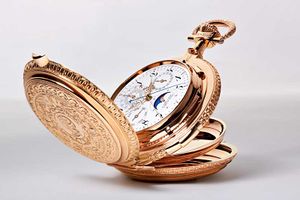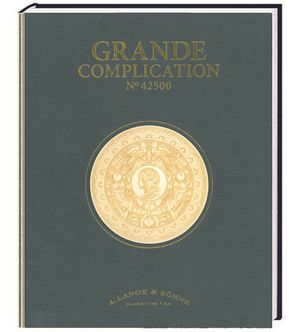Grande Complication No 42500 (Book): Unterschied zwischen den Versionen
(JFmapuPugejXkTV) |
K (Änderungen von 202.112.50.96 (Diskussion) rückgängig gemacht und letzte Version von Torsten wiederhergestellt) |
||
| Zeile 1: | Zeile 1: | ||
| − | + | '''Grande Complication N<sup><u>o</u></sup> 42500''' | |
| + | {{other languages|[[Grande Complication No 42500 (Buch)|de]]|[[Grande Complication No 42500 (Book)|en]]}} | ||
| + | [[Datei:Grande Complication No 42500 (Buch).jpg|thumb|The famous front-lid “Graff engraving” adorns the cover of the book.]] | ||
| + | [[Bild:A. Lange & Söhne Uhr No. 42500 Geöffnet.jpg|thumb|The Grande Complication with the serial number 42500 crafted by [[A. Lange & Söhne/en|A. Lange & Söhne]]]] | ||
| + | Glashütte, September 2010 | ||
| + | |||
| + | ''A book dedicated entirely to one watch must be quite extraordinary. Indeed: The Grande Complication with the serial number 42500 crafted by A. Lange & Söhne is a horological opus with an eventful history now spanning over one hundred years. The report that describes its inception, its restoration, and its comeback is a revelation for every Lange collector and an enriching diary for everyone with a penchant for precision watchmaking.'' | ||
| + | |||
| + | In 2001, a unique horological treasure returned to the place where it had been made nearly one hundred years earlier. The rarest, most complicated, and most significant timepiece that had ever left the [[A. Lange & Söhne/en|A. Lange & Söhne]] [[manufactory]] was originally sold to a Viennese gentleman of independent means. It came back in a pitiful state. Many of the 883 parts had corroded or were broken and needed to be painstakingly reconstructed by the master watchmakers in the restoration atelier. But from the very beginning, [[Lange Uhren GmbH|Lange’s]] experts realised that the historic value of the watch justified every conceivable effort. During the carefully documented restitution process, the watch divulged many of its long-kept secrets and repeatedly challenged its saviours with seemingly insurmountable problems. But just in time for the kickoff of the 2010 anniversary events that commemorate the establishment of the German precision watchmaking industry by [[Ferdinand Adolph Lange]] 165 years ago, “[[Die Grande Complication No 42500 von A. Lange & Söhne|the 42500]]” presented itself to the public in its original splendour. Today, all [[Complication/en|components of its complicated mechanisms]] function as flawlessly as they did over 100 years ago. | ||
| + | |||
| + | The book about the “[[Die Grande Complication No 42500 von A. Lange & Söhne|Grande Complication No 42500]]” portrays the watch as a monument to horological prowess and human passion. It describes the work expended to restore it as a journey of discovery that brings together the ingenuity of the masters of old with the artistry of our generation’s watchmakers. The anthology of full-page macro images offers a breathtaking account of how the 42500 unites the aesthetic beauty of an idea with artisanship at its finest. In a conversation with auctioneer [[Stefan Muser]], readers learn how to gauge the value of an irreplaceable pocket watch. The narrative of the restoration process is an in-depth exploration of the complex movement. Experts explain the significance of the Grande Complication in the history of watchmaking as well as the design and function of horological extravagances like [[Repeater|minute repeaters]], [[Double Chronograph/en|rattrapante chronographs]], and [[Perpetual calendar|perpetual calendars]]. | ||
| + | |||
| + | |||
| + | [[Category:Watch-Wiki news archive 2010]] | ||
Version vom 8. Januar 2011, 15:17 Uhr
Grande Complication No 42500
| other languages: de en |

Glashütte, September 2010
A book dedicated entirely to one watch must be quite extraordinary. Indeed: The Grande Complication with the serial number 42500 crafted by A. Lange & Söhne is a horological opus with an eventful history now spanning over one hundred years. The report that describes its inception, its restoration, and its comeback is a revelation for every Lange collector and an enriching diary for everyone with a penchant for precision watchmaking.
In 2001, a unique horological treasure returned to the place where it had been made nearly one hundred years earlier. The rarest, most complicated, and most significant timepiece that had ever left the A. Lange & Söhne manufactory was originally sold to a Viennese gentleman of independent means. It came back in a pitiful state. Many of the 883 parts had corroded or were broken and needed to be painstakingly reconstructed by the master watchmakers in the restoration atelier. But from the very beginning, Lange’s experts realised that the historic value of the watch justified every conceivable effort. During the carefully documented restitution process, the watch divulged many of its long-kept secrets and repeatedly challenged its saviours with seemingly insurmountable problems. But just in time for the kickoff of the 2010 anniversary events that commemorate the establishment of the German precision watchmaking industry by Ferdinand Adolph Lange 165 years ago, “the 42500” presented itself to the public in its original splendour. Today, all components of its complicated mechanisms function as flawlessly as they did over 100 years ago.
The book about the “Grande Complication No 42500” portrays the watch as a monument to horological prowess and human passion. It describes the work expended to restore it as a journey of discovery that brings together the ingenuity of the masters of old with the artistry of our generation’s watchmakers. The anthology of full-page macro images offers a breathtaking account of how the 42500 unites the aesthetic beauty of an idea with artisanship at its finest. In a conversation with auctioneer Stefan Muser, readers learn how to gauge the value of an irreplaceable pocket watch. The narrative of the restoration process is an in-depth exploration of the complex movement. Experts explain the significance of the Grande Complication in the history of watchmaking as well as the design and function of horological extravagances like minute repeaters, rattrapante chronographs, and perpetual calendars.
